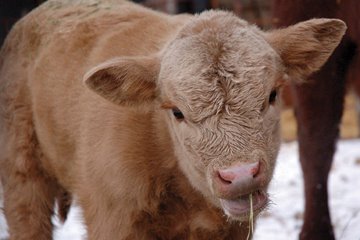by Karen Emilson
Confusion over U.S. Mandatory Country of Origin labeling (M-COOL) continues as cattle producers and packers on both sides of the border wait to see how Barack Obama’s administration plans to deal with the proposed M-COOL legislation.
On January 20, 2009, the newly inaugurated President Obama put all pending rules brought forward by the Bush Administration on hold. Included in that list is the Final Rule on M-COOL - a requirement in the 2008 U.S. Farm Bill that covers numerous commodities including beef (specifically muscle cuts and ground beef) requiring that these food products must be labeled at the retail level to indicate country of origin.
Speculation on how COOL would affect movement of both feeder and fat cattle into the U.S. caused growing concern and uncertainty within the Canadian cattle industry since the idea was brought forward by U.S. agricultural lobby groups in 2002.
Last fall, years of speculation came to a head when details of the COOL Interim Rule were announced. Cattle were divided into the following four labelling classes:
A) U.S. born, raised and slaughtered;
B) Born in Canada, exported to U.S. as feeder, finished and slaughtered in U.S.;
C) Exported into the U.S. from Canada for immediate slaughter; and
D) Exported in boxes to the U.S.
In order for the packing plants to label properly, cattle from the different classes would have to be segregated. Feedlots in the U.S. responded by minimizing the amount of Canadian cattle they imported, due to uncertainty about whether or not they’d be able to get those cattle killed. A number of U.S. packing plants announced they would not be killing Canadian cattle at all.
After a full review of the ramifications, the Canadian government filed a WTO trade challenge.
On January 12, 2009, the United States Department of Agriculture (USDA) announced details of the Final Rule which proposed the combining of classes—specifically that class C cattle can be put with class B cattle if there is co-mingling of the B and C cattle on same kill day.
The Canadian cattle industry called the compromise fair and the WTO trade challenge was withdrawn.
Latest development
The Obama Administration memorandum of January 20th, directed agency heads to withdraw all proposed or final regulations, (with the exception of emergency situations) that have not been published in the Federal Register. The memorandum also called on agency heads to extend for 60 days the effective date of regulations that have already been published in the Federal Register, but have not yet taken effect. The Final COOL Rule falls into the latter category since it has been published in the Federal Register, but was not scheduled for implementation until mid-March.
Federal agriculture minister, Gerry Ritz, said he was not surprised by Obama’s decision. He also said he would be communicating with the new U.S. Secretary of Agriculture in early February.
John Masswohl with the Canadian Cattlemen’s Association reported that the WTO challenge will remain suspended. He explained that the challenge was initially filed against the Interim Rule but with the Final Rule on file as the most current piece of proposed legislation (and it is favourable toward the Canadian industry) there is no need to pursue the WTO challenge at this time.
So for now, Canadian cattlemen are once again forced to take a “wait and see” attitude. The 60 day comment period has re-opened and all concerned groups can submit briefs for review and consideration.
With some groups in the U.S. not completely in favour of the law—including the National Cattlemen’s Beef Association (NCBA)— there is some confidence within the Canadian cattle industry that the Final Rule will pass as proposed.
With some of its membership heavily reliant on imports of Canadian cattle, the NCBA has lobbied to have the regulations softened to minimize the added expense and inconveniences incurred by U.S. feedlots and packing plants.
Welcome to the Online Edition of Cattle Country!
Updated with every new issue
Past issues will be available in the archive. If you are interested in reading Late Breaking News between paper deadlines, scroll down to the bottom of the page. The most recent information will be posted first.
Past issues will be available in the archive. If you are interested in reading Late Breaking News between paper deadlines, scroll down to the bottom of the page. The most recent information will be posted first.

Thursday, February 12, 2009
Subscribe to:
Post Comments (Atom)

No comments:
Post a Comment